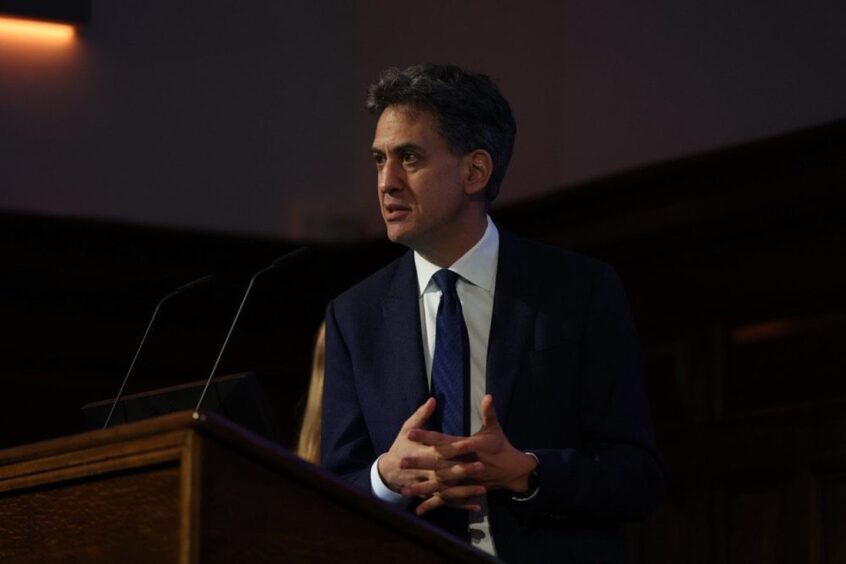
Ed Miliband has said the government is “determined to drive forward nuclear through both public and private investment”, despite what he described as “immense” challenges in the public finances.
“We need all the power sources at our disposal, and nuclear has an essential role to play in the future age of clean electricity,” Miliband said while speaking in London at the Nuclear Industry Association conference on Thursday.
Addressing a room of nuclear energy professionals, he said the industry has a “crucial role to play in powering Britain’s clean energy future”.
“This industry offers huge opportunities not just to deliver energy security and climate security, but economic security for workers and communities across our country,” Miliband said.
Miliband indicated that he will work with Philip Hunt, who he referred to as the UK’s nuclear minister, to realise the nuclear industry’s potential to deliver on energy and climate security.
“We should be enthusiastic about nuclear not just for what it offers for our energy system but what it offers in terms of jobs, investment, industry and exports,” Miliband said.
Miliband reaffirmed his stance towards nuclear energy as firmly supportive, despite controversies over the safety of nuclear waste.
As the former cabinet minister in 2009, he identified eight sites for nuclear generation which remain in the planning framework.
He acknowledged that “this was a relatively controversial position, with parts of the environmental movement deeply opposed to nuclear”; a debate, he said, which has since “shifted”.
“More people now recognise that whatever the challenges of nuclear, they pale in comparison to the energy security and climate threats we face,” he said, highlighting government projections that electricity demand could rise by half by 2035 and double by 2050.
“We need nuclear, wind, solar, batteries, tidal stream, hydrogen, carbon capture.”
NESO response out ‘shortly’
The UK’s energy secretary said the focus of the UK’s clean power mission has shifted beyond the end of the decade, on the day that prime minister Keir Starmer revised the clean power target to 95%, down from 100%, by 2030.
Miliband did stress that “short-term delivery matters as much if not more” and said the government is preparing to lay out plans for the energy system to the end of the decade and beyond.
He said government will consult on a new nuclear planning framework next year, and deliver on a nuclear skills plan to upskill the workforce.
“On planning, we will be consulting on a new nuclear planning framework and siting policy next year,” he said.
“On grid, we are reforming the connections queue and working to get network infrastructure built quicker. That’s something really important in our clean power action plan which will be out shortly.”
Miliband said that the trilemma of energy security, affordability and sustainability, once viewed as comprising competing goals, has “disintegrated”.
This was “brought into sharp relief” by Russia’s invasion of Ukraine and the cost-of-living crisis, which together showed how exposed the UK is due to a reliance on fossil fuels.
“That is why we see such an imperative – to drive towards clean, homegrown electricity – not just for the climate reasons that might have been the traditional reasons, but for energy security and affordability reasons,” said Miliband.
The energy secretary said the government will publish its response to the advice from the National Energy System Operator (NESO), which said nuclear would play a role in achieving clean power this decade, “shortly”.
“Given the long lead times of new nuclear, it is the period beyond 2030 which will also define the future,” he said. “So building on our 2030 plan and the NESO Strategic Spatial Energy Plan, we will set out plans for the energy system into the 2030s and beyond.”
The UK will work with French electricity supplier EDF to get Hinkley Point C built as a priority, the energy secretary said.
EDF recently extended existing nuclear plants Heysham 1 and Hartlepool to 2027 and Heysham 2 and Torness to 2030, following repeated delays to Hinkley Point.
Sizewell C and small modular reactors will be next on his list of priorities, after the Chancellor confirmed £2.7bn of funding to continue the development of Sizewell C next year in the budget.
Miliband said that a final investment decision will be taken at the government’s spending review, expected June 2025, on whether to proceed with Sizewell C.
“There are obviously already hundreds of workers on the Sizewell site,” he said. “The equity and debt raise process will shortly move to its final stages.”
Modular reactors and ‘industrial revolution’
Miliband called small modular reactors “a massive industrial opportunity” for the UK, saying Great British Nuclear will act as an independent sister company to Great British Energy.
GB Nuclear, formerly British Nuclear Fuels ltd (BNFL), has already begun contract negotiations with four companies shortlisted in the small modular reaction competition. He said decisions on these projects will be made “in Spring”.
Modular reactors could “power the fourth industrial revolution”, with interest “supercharged by the rise of AI”, he said.
The government will “shortly be publishing” a review of how to maximise the potential of nuclear fusion at the National Nuclear Laboratory, Miliband added.
He outlined “significant potential” for manufacturing next-generation technology in the industrial heartlands.
“We want to be a partner committed to your success. Because nuclear offers huge opportunities for our clean energy mission.”

 © Supplied by SSEN
© Supplied by SSEN © Bloomberg
© Bloomberg